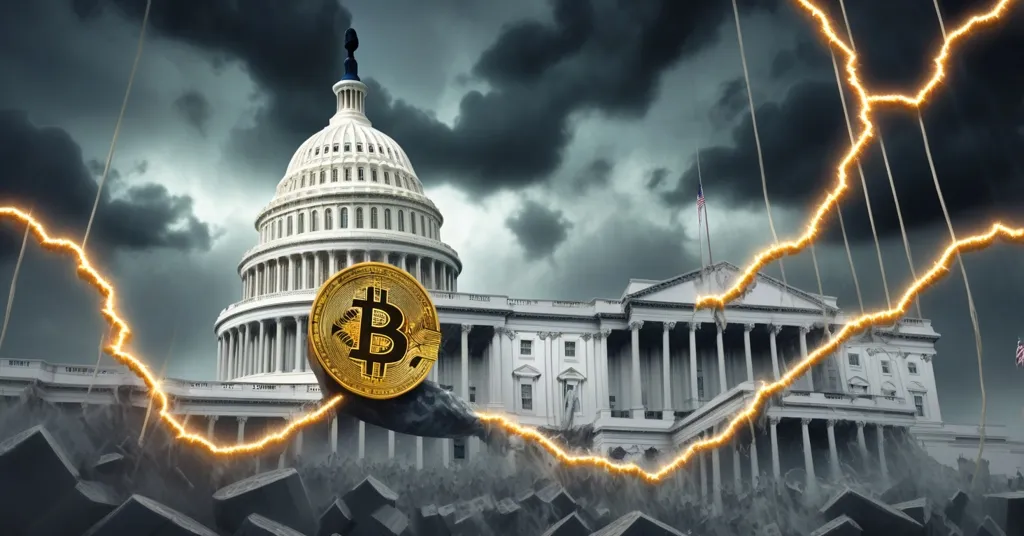U.S. Shutdown Stalls Crypto Regulation as Bitcoin Surges Past $120K in Uptober Rally

U.S. Government Shutdown Threatens Crypto Progress While Bitcoin’s Uptober Soars Past $120,000
The U.S. government shutdown, now grinding through its second day, has left Congress deadlocked over budget disputes and healthcare policy, with no resolution on the horizon. As federal workers grapple with unpaid bills, the crypto industry braces for regulatory delays, even as Bitcoin smashes through $120,000 in its historic October rally known as “Uptober.” This clash of political chaos and market momentum exposes both the promise and the peril of decentralized finance in today’s fractured system.
- Shutdown Outlook: Polymarket predicts a 43% chance the standoff lasts beyond October 15.
- Crypto Delays: SEC furloughs and CFTC constraints could stall Bitcoin ETF approvals and oversight.
- Bitcoin Surge: Uptober momentum pushes Bitcoin past $120,000, though risks loom from political uncertainty.
Shutdown Basics: What’s Behind the Chaos?
The heart of this shutdown is a bitter budget disagreement between the two dominant U.S. political parties—Republicans and Democrats. Republicans want a temporary funding fix to keep government operations running, while Democrats push for a long-term solution tied to healthcare subsidies and Medicaid expansions. A particularly thorny issue? Republicans accuse Democrats of trying to extend benefits to undocumented immigrants, a claim Democrats flatly reject. One Democratic aide framed the tension sharply:
Healthcare has become the battlefield in this fight. But we’re not negotiating on misinformation, we’re negotiating on real policy priorities.
The fallout is immediate and painful for hundreds of thousands of federal workers, who are either working without pay or furloughed—sent home with no income. Tony Reardon, president of the National Treasury Employees Union, highlighted the human toll:
It’s not just numbers on a spreadsheet; these are families struggling to make rent and buy groceries.
Public sentiment isn’t much rosier. On Polymarket, a decentralized prediction market where users bet on real-world outcomes, 43% of participants expect the shutdown to drag past October 15. Only 3% believe it’ll resolve before October 5, with 35% betting on October 10-14 and 20% on October 6-9. For those new to prediction markets, think of them as a crowd-sourced crystal ball—often more revealing than polished polls. One trader captured the cynicism:
The numbers show how little confidence there is in Washington right now. Most of us are betting on a long haul, not a quick fix.
Crypto Caught in the Crossfire: Regulatory Roadblocks Ahead
For the cryptocurrency community, this political circus isn’t just background noise—it’s a direct threat to progress. The Blockchain Association, a key advocacy group for digital assets, has sounded the alarm, urging bipartisan action to prevent regulatory efforts from being derailed. Their frustration is palpable:
Clear rules of the road for crypto shouldn’t take a back seat to political games.
Here’s why this matters. Two major U.S. agencies—the Securities and Exchange Commission (SEC) and the Commodity Futures Trading Commission (CFTC)—oversee critical aspects of crypto markets. The SEC decides whether tokens are securities (like stocks, requiring strict rules) or not, and greenlights products like Bitcoin exchange-traded funds (ETFs), which let traditional investors buy into Bitcoin’s price movements without owning it directly. The CFTC, meanwhile, governs futures and derivatives markets, including Bitcoin futures, shaping how these assets are traded and hedged. With staff furloughs at the SEC and resource cuts at the CFTC during the shutdown, decisions on Bitcoin ETFs, stablecoin frameworks, and broader market rules could be delayed indefinitely.
Take Bitcoin ETFs as an example. These funds are a gateway for institutional money—think hedge funds and pension plans—to pour into crypto without the hassle of managing wallets or private keys. A delay in approvals keeps that capital on the sidelines, slowing mainstream adoption. Then there’s pending legislation, like the Digital Asset Market Structure Bill, which aims to clarify whether cryptocurrencies fall under SEC or CFTC jurisdiction. Without movement on such frameworks, the industry remains in limbo, vulnerable to both overreach and exploitation by bad actors. It’s the kind of mess that makes you want to HODL harder and ditch centralized systems altogether.
Bitcoin’s Uptober: Defying the Odds Amid Chaos
Despite Washington’s dysfunction, Bitcoin seems unfazed for now, rocketing past $120,000 in what the community calls “Uptober”—a nod to the coin’s historically strong performance in October. Since 2013, Bitcoin has often posted double-digit percentage gains this month, driven by a mix of market psychology, seasonal trends, and sometimes just pure FOMO (fear of missing out). This year’s surge fits the pattern, with traders riding the wave of optimism. But analysts are quick to wave a red flag, warning that political uncertainty could spoil the party. One market observer noted:
Markets are riding Uptober momentum right now, but Washington uncertainty is always a risk factor.
Let’s cut through the hype. Anyone claiming Bitcoin will moon to $200,000 next week while D.C. burns is selling snake oil—don’t buy it. Markets are messy, and a prolonged shutdown could erode investor confidence, especially if regulatory bottlenecks pile up or broader economic pain spills over. Bitcoin’s resilience is real, but it’s not invincible. History shows gains can reverse fast when systemic shocks hit—think 2018’s crypto winter or 2022’s bear market after inflation fears spiked. Uptober or not, we’re not peddling fairy tales here.
Economic Ripples: How Shutdown Fallout Could Hit Crypto
Beyond regulation, the shutdown’s economic impact could indirectly sting crypto markets. If the stalemate drags on, delayed federal payments—to contractors, agencies, or even Social Security recipients—could sap consumer confidence. Less disposable income means less speculative investment, which often fuels assets like Bitcoin during bullish runs. Higher uncertainty might also nudge interest rates or Treasury yields, as seen in past shutdowns like 2013 or 2018-19, subtly shifting investor appetite for riskier bets like cryptocurrencies.
Picture this: a small retail investor, already skittish after last year’s market dips, sees headlines of federal workers unpaid and government services halted. They hesitate to double down on Bitcoin, even at $120,000, fearing a wider downturn. Multiply that by thousands, and you’ve got a sentiment shift. It’s not guaranteed, but it’s a ripple worth watching. Crypto isn’t an island, no matter how much we wish it were.
Why Decentralization Shines—And Its Limits
This shutdown lays bare why so many of us champion Bitcoin and decentralized systems. When centralized powers can’t even fund themselves, leaving workers stranded and industries in limbo, the case for self-sovereign finance—where you control your money without relying on flawed institutions—grows louder. Blockchain technology offers a way out, bypassing middlemen and building trust through code, not corruptible systems. Every day of dysfunction in D.C. is another argument for why the world needs crypto more than ever.
But let’s play devil’s advocate. Some Bitcoin maximalists might cheer these delays, arguing less government meddling keeps crypto pure and unstoppable. Fair point—until you remember that unchecked markets can breed scams, rug pulls, and volatility that burn the very newcomers we’re trying to onboard. Look at the 2021-22 cycle: billions lost to fraud and collapses like FTX, partly because regulatory guardrails were missing. Regulation, as sluggish and maddening as it is, can provide clarity that boosts adoption. Without it, we risk a Wild West that scares off institutional players and mainstream users. Decentralization is the goal, but we’re not there yet, and pretending otherwise is reckless.
Zooming out, this chaos tests the ethos of effective accelerationism—the idea that pushing tech like blockchain forward, fast, can solve systemic failures. If government gridlock is the spark, is crypto’s rapid sidestep the acceleration we need? Or are we rushing headlong into uncharted risks? It’s a question worth wrestling with as we watch Bitcoin climb against a backdrop of centralized collapse.
Key Takeaways and Questions for Crypto Enthusiasts
- How does the U.S. government shutdown affect the crypto industry?
It risks stalling crucial regulatory progress, with SEC staff furloughs potentially delaying Bitcoin ETF approvals and a resource-thin CFTC slowing oversight rules, which could choke growth and mainstream adoption. - Why is the Blockchain Association sounding the alarm now?
They fear political gridlock will derail efforts to establish clear crypto regulations, pressing Congress to focus on digital assets over partisan fights to keep industry momentum alive. - Can Bitcoin’s Uptober rally hold up against political turmoil?
Bitcoin’s climb past $120,000 shows strength, but analysts caution that extended shutdowns could breed market uncertainty, potentially shaking investor trust despite seasonal bullish trends. - What do prediction markets like Polymarket tell us about public sentiment?
With 43% betting the shutdown lasts beyond October 15, Polymarket exposes deep skepticism in Washington’s ability to act swiftly, offering a raw glimpse into collective expectations. - How might broader economic fallout impact crypto markets?
Delayed federal payments and shaken consumer confidence could curb speculative investments like Bitcoin, while shifts in Treasury yields or interest rates might alter risk appetite for digital assets. - Why should crypto advocates care about government failures?
These failures slow regulatory clarity and economic stability, both shaping crypto’s path—delays hinder innovation, while uncertainty can sway how investors approach decentralized assets. - Does this shutdown strengthen the case for decentralization?
Yes, it highlights centralized flaws, boosting the appeal of self-sovereign finance, though without some regulation, risks like fraud could undermine trust and adoption in the short term.
Forward-Looking: Crypto’s Test Amid Centralized Chaos
As Bitcoin soars past $120,000, shadowed by a government that can’t pay its own bills, we’re witnessing a collision of two realities: one of innovation and freedom, the other of red tape and petty squabbles. For those of us rooting for decentralization, this shutdown is both a frustration and a validation. It frustrates because it drags down our march toward a freer financial future with regulatory delays. It validates because it exposes the cracks in centralized systems that Bitcoin was forged to shatter. The question now is whether this chaos will be the ultimate test of crypto’s resilience—or a stark reminder that we’re still tethered to the old world’s failures. As we watch, trade, and build, one thing is clear: every glitch in the system is a call to accelerate toward something better.
Quick Glossary for Newcomers
- Furlough: Temporary leave for government workers without pay during a shutdown, meaning no income until resolved.
- SEC (Securities and Exchange Commission): U.S. agency regulating securities, deciding if crypto tokens are like stocks and approving products like Bitcoin ETFs.
- CFTC (Commodity Futures Trading Commission): U.S. agency overseeing futures and derivatives, including Bitcoin futures, shaping crypto trading rules.
- Decentralized Finance (DeFi): Financial systems on blockchain, cutting out middlemen like banks, letting users control their money directly.



